

Healing with light
How Photobiomodulation is changing dental care


• Spa-Like Relaxing Atmosphere
• Free Nitrous Oxide and Oral Conscious Sedation
• Cone Beam 3D Radiography
Digital Scanner – No More Gooey Impressions
• Botox and Dermal Filler
Master Injector
• Platinum Invisalign Provider


Red light therapy, also known as photobiomodulation (PBM) or low-level laser therapy, uses red and near-infrared light to stimulate healing, reduce inflammation, and relieve pain. PBM works by enhancing mitochondrial ATP production, cell signaling, and growth factor synthesis, while also reducing oxidative stress. This therapy is used for a variety of conditions, and dentists are using PBM lasers in many ways to make your treatment experience easier and your recovery faster. If you experience dentin hypersensitivity, TMJ pain, cold sores, lichen planus, or going through cancer treatment, PBM laser therapy can help!
1. Pain relief
After tooth extractions, root canals, or dental implants, this therapy can reduce discomfort- sometimes even better than pain medication, but without the side effects.
2. Faster healing
Whether you’ve had gum surgery or a sore spot from your denture, photobiomodulation helps tissues heal more quickly and naturally. Red or swollen gums? This therapy helps calm inflammation, making it great for patients with gum disease or other oral infections
3. Cold sore prevention and treatment
If you tend to get cold sores, you know how one can come on at inopportune times. Whether you’re feeling the first tingle or you have an active lesion, PBM drastically reduces severity and duration of cold sore. You can also receive treatments to help prevent developing cold sores in the first place!
4. Orthodontic comfort
Braces adjustments can be painful. Photobiomodulation soothes soreness and may even help teeth move faster, making your treatment shorter.
5. Cancer care support
Patients going through cancer treatments often get painful mouth sores (called mucositis). PBM lasers can reduce that pain and help those sores heal faster.
What to expect
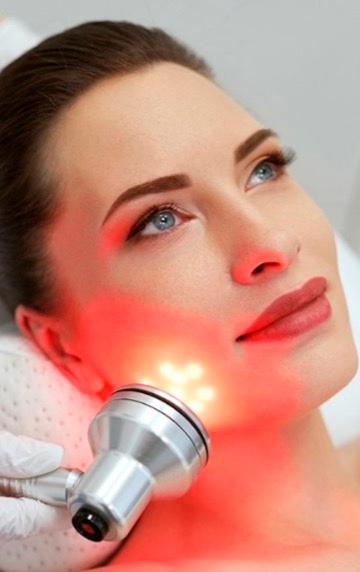
• Quick and Easy: Treatments usually take just a few minutes.
• Painless: No discomfort during or after.
• No Recovery Time: You can get back to your day right away.
A brighter future for your mile
Photobiomodulation is one of the most exciting innovations in dental care today, and we are excited to offer it at Roswell Dental Care. It offers a natural, drug-free way to help you feel better faster after dental procedures. If you’re curious about how it might help you, just call and we will be happy to explain how this healing light can brighten more than just your smile.
Dr. Destinee Hood gives your comfort and trust top priority. We assure you feel confident in any dental solution before beginning treatment after a thorough and comprehensive examination. For enhanced comfort, we offer FREE conscious sedation, including nitrous oxide. Rest assured that your experience will be positive, relaxing, and rewarding. Take the first step in feeling great about your oral health. Schedule your oral health screening and give us a call at (770) 998-6736 or visit www.RoswellDentalCare. com.
Destinee Hood
A major step forward in understanding Multiple Sclerosis (MS)
Brought to you by –
Dr. Brent Taylor, Premier Dermatology and Mohs Surgery of Atlanta
While I usually focus on dermatology, every so often, a discovery from another field demands attention. A recent, elegantly designed study has produced compelling evidence that some cases of multiple sclerosis (MS) may be caused by bacteria in the Lachnospiraceae family.
MS is a chronic disease where the immune system mistakenly attacks the central nervous system—the brain and spinal cord. MS often worsens over time, leading to disability and reduced life expectancy. Common symptoms include fatigue, difficulty walking, balance problems, and cognitive impairment—issues that severely impact quality of life.
In recent years, the importance of gut health in overall wellness has come into focus. We now frequently hear about the “gut-skin,” “gut-joint,” and “gut-brain” axes, suggesting that gut health is closely tied to the health of distant organs. We’re just beginning to understand how gut bacteria— collectively known as the gut microbiome— play a role in both health and disease.
Clues to MS’s origins have come from a related condition, Guillain-Barré Syndrome (GBS). In GBS, the immune system attacks the protective sheath around peripheral nerves, leading to symptoms like hand and foot weakness and sometimes paralysis. A well-established trigger for GBS is Campylobacter jejuni. Its surface proteins mimic those found in human nerves closely enough to confuse the immune system, leading the immune system to attack both the bacteria and the body’s own tissues—a phenomenon called molecular mimicry.
Since the 1982 discovery that C. jejuni can cause GBS, researchers have hunted for a similar microbial trigger for MS. Many studies proposed potential bacterial culprits, but with thousands of gut bacteria to sort through, most leads fell flat.
That may have changed in February 2025. A breakthrough study involved using a mouse model that mimics MS when mice are exposed to certain gut bacteria. In sterile environments, these mice remained healthy, but once exposed to normal gut flora, they could develop a MS-like illness. They were more likely to develop this illness if the bacteria came from the gut of people with MS. The challenge was identifying which specific bacteria were responsible.
The game-changing insight came from studying identical twins where one twin has MS and the other does not. Researchers

collected bacterial samples from the ileum and colon—both stool and wall-adherent bacteria—from these twins. The twins’ DNA might be identical, but their gut microbiomes were not! Researchers transferred these bacterial communities into the MS-prone mice. The result: mice receiving microbiota from MS-affected twins developed illness, and a bloom of bacteria from the Lachnospiraceae family was observed. Two species in particular—Eisenbergiella tayi and Lachnoclostridium—were linked to disease development.
While this study is a landmark in neurology, its implications extend to autoimmune diseases across the body, including those of the skin. For example, patients with inflammatory bowel disease are nearly three times more likely to have severe psoriasis, a chronic skin condition. Molecular mimicry involving the gut microbiome could be a unifying cause in many autoimmune disorders.
Why the ileum and not some other part of our gut such as the stomach? The stomach is extremely acidic. In contrast, the pH of the ileum is around 7.4 – similar to the rest of our body. The bacteria that thrive in the ileum could also easily thrive in the rest of our body, so bacteria in the ileum pose more of a threat of invading and causing disease. To defend our bodies from the bacteria that live in the ileum, the immune system has to be hypervigilant – sometimes too vigilant. The ileum has specialized lymphoid structures to train aggressive immune system cells. But highly trained immune cells can sometimes become overzealous attacking not just harmful invaders, but our own tissues as well. Sometimes, autoimmunity is a consequence of having a part of our gut be the same pH as the rest of our body and of having to fight off the bacteria that grow there.
The discovery of Lachnospiraceae in the ileum likely causing some cases of MS is exciting because it offers a roadmap for uncovering microbial causes of autoimmune diseases more broadly. If a suitable animal model exists for a disease, and if human twin pairs can be identified where only one of the two twins is affected, this approach could be replicated across various conditions—perhaps in psoriasis, certain types of eczema or in hidradenitis.
We are entering an era when the microbiome may hold the key to some of medicine’s most enduring mysteries. As our understanding of these bacterial-human interactions deepens, causes of disease will be identified, and new treatments will follow.
Insist on the BEST
Dr. Brent Taylor is a Board-Certified Dermatologist, a Fellowship-Trained Mohs Surgeon, and is certified by the Board of Venous and Lymphatic Medicine in the field of Vein Care.
He is an expert in skin cancer and melanoma treatment, endovenous laser ablation, minimally invasive vein procedures and cosmetics procedures such as Botox and injectables.
Kathryn is a certified physician assistant with over 22 years experience as a Dermatology PA and cosmetic dermatology.
Her specialties include general dermatology such as acne, eczema, rashes, hair loss, full body skin exams, abnormal growths etc. Kathryn also specializes in cosmetic dermatology including lasers, injectables, micro-needling, PRP, facial peels, sclerotherapy for spider veins and at home skin care.
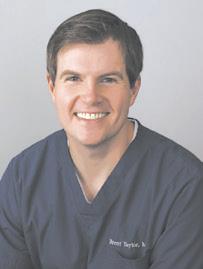

Kathryn Filipek, PA-C
Bad breath: Causes, prevention, and treatments
Brought
Dr. Bradley Hepler, Atlanta Center for Dental Health
Bad breath—also known as halitosis— is something nearly everyone experiences at some point. Whether it’s morning breath or a more persistent issue, it can be embarrassing and even impact your social confidence. Fortunately, understanding the causes and solutions can help keep your breath fresh and your mouth healthy.
Common causes of bad breath
Most cases of bad breath start in the mouth. The leading culprit? Bacteria. Your mouth is home to hundreds of types of bacteria, and when they feed on leftover food particles, they produce foul-smelling sulfur compounds.
Here are the most common sources of halitosis:
• Poor oral hygiene: Infrequent brushing or flossing allows food debris and plaque to accumulate, leading to odorproducing bacteria.
• Dry mouth: Saliva helps wash away food and bacteria. If your mouth is dry— due to dehydration, medication, or mouth breathing—bad breath can result.
• Food choices: Garlic, onions, and spicy foods can contribute to temporary
bad breath, as can high-protein or lowcarb diets.
• Gum disease: Persistent bad breath can be an early warning sign of gum disease (gingivitis or periodontitis), where bacteria infect the gums and bone supporting the teeth.
• Tongue coating: A coated tongue, especially at the back, is a common and overlooked source of odor.
• Medical conditions: Though less common, chronic bad breath can be linked to conditions like sinus infections, acid reflux, diabetes, or liver/kidney problems.
Prevention tips
The best way to fight bad breath is to maintain excellent oral hygiene and healthy habits. Here’s what you can do:
1. Brush and floss regularly: Brush your teeth at least twice a day and floss daily. Don’t forget to gently brush your tongue or use a tongue scraper.
2. Stay hydrated: Drink plenty of water throughout the day to keep your mouth moist and stimulate saliva production.
3. Avoid tobacco products: Smoking and chewing tobacco dry out the mouth and leave behind strong odors.
4. Watch your diet: Limit odor-causing foods and try to eat more crunchy fruits and vegetables, which help clean the teeth


and boost saliva.
5. Chew sugar-free gum: This stimulates saliva flow and can help mask temporary odors.
6. Visit the dentist: Regular cleanings and exams can catch issues like gum disease or tooth decay before they worsen.
Treatment options
If you’ve tried basic hygiene improvements and bad breath persists, it’s time to dig deeper:
• Professional dental cleaning: Removing tartar and plaque buildup can dramatically reduce odor.
• Treat underlying infections: Cavities, gum disease, or abscesses may need treatment to eliminate the source.
• Manage dry mouth: Over-the-counter rinses or medications may help, especially if it’s medication-induced.
• Medical consultation: If your dentist rules out oral causes, a doctor can check for gastrointestinal, sinus, or metabolic conditions.
Bad breath is a common problem, but it doesn’t have to be permanent. With good hygiene, regular dental care, and a little attention to diet and lifestyle, you can keep your breath fresh—and your confidence high.
“Preventive Dentistry can add 10 years to human life.”
-Dr. Charles Mayo of the Mayo Clinic
Dr. Bradley Hepler and the experienced team at the Atlanta Center for Dental Health provide the most modern advances in dentistry. Experience immediate results with procedures to greatly enhance your smile and your health. If you would like a complimentary consultation to discover the best options for you, please call us at 770-992-2236.

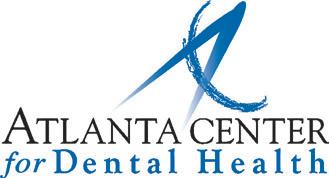
ADOBE STOCK
Your DNA holds the key
How Nutrigenomics is shaping the future of preventive and regenerative health
Brought to you by – OlympusMD
In today’s rapidly evolving health landscape, nutrigenomics—the study of how nutrition interacts with your genes—is transforming how we approach wellness. Rather than relying on generalized plans, nutrigenomics enables a highly personalized strategy rooted in your unique genetic makeup. It’s the foundation of a new era in preventive and regenerative medicine.
Your DNA can reveal how your body responds to inflammation, processes fats and carbohydrates, detoxifies, and absorbs key nutrients. These insights allow for the creation of customized protocols that go far beyond diet. Think personalized, precision-formulated nutraceuticals, targeted IV infusions, and peptide stacks designed to enhance cellular repair, metabolic efficiency, and immune function—all guided by your genetic blueprint.
For individuals struggling with weight, genetic testing can identify metabolic tendencies or appetite control genes that influence how your body stores fat or
responds to exercise. This allows for tailored medical weight loss programs that are more effective and sustainable because they’re not based on guesswork—they’re built from your biology.
Peptides, short chains of amino acids that act as cellular messengers, can be used strategically alongside nutrigenomics to support hormone balance, reduce inflammation, or promote tissue regeneration. When these are aligned with DNA-driven insights, they become even more powerful tools in restoring optimal function and vitality.
IV therapy, another cornerstone of this approach, delivers high-impact nutrients directly into the bloodstream—adjusted to your unique needs, whether it’s boosting mitochondrial health, enhancing detox pathways, or supporting cardiovascular resilience.
This integration of genetics with custom therapies marks a shift from reactive care to truly personalized, proactive health optimization. Nutrigenomics isn’t just about what you eat—it’s about unlocking your body’s full potential from the inside out.
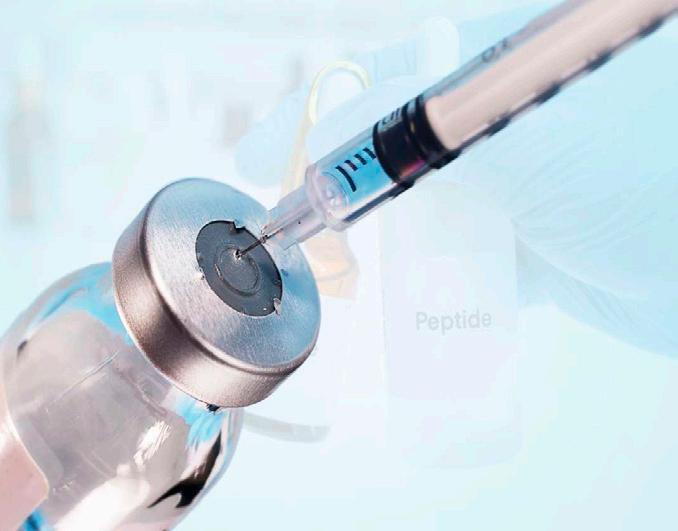
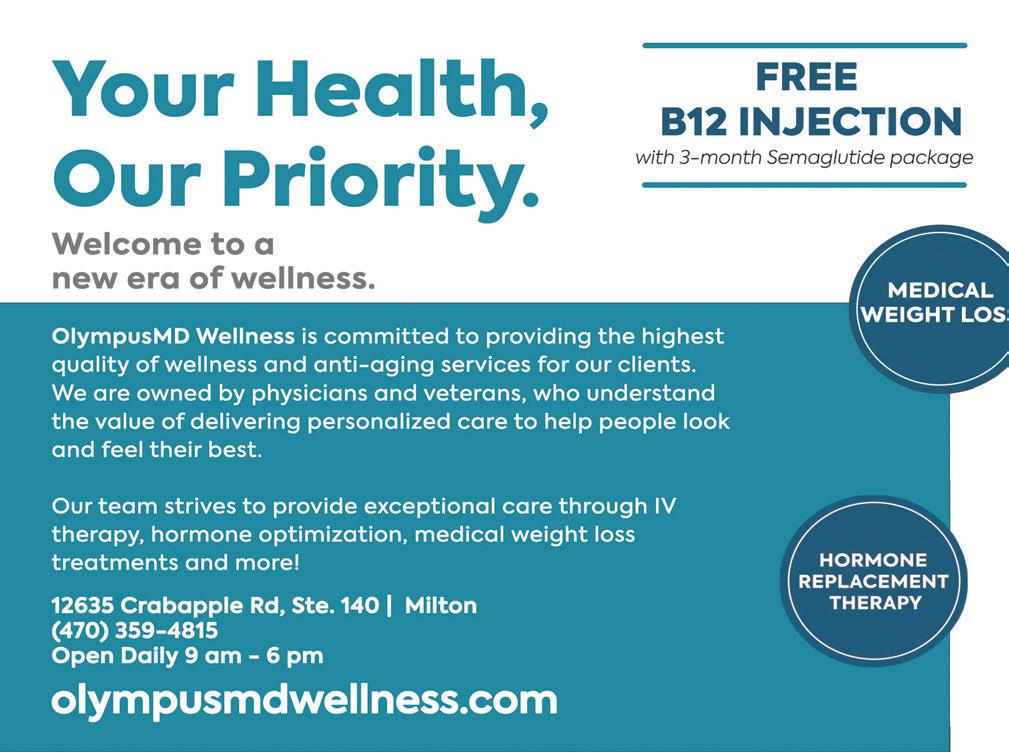
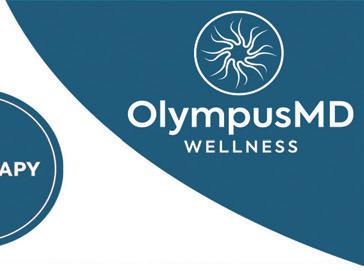


Your body’s check engine light: Don’t wait for it to flash

Brought to you byDr. Scott Miller, Wellstar Urologist
Most men pride themselves on being low maintenance. If nothing’s obviously wrong, why bother going to the doctor?
But here’s the thing— just like your car, your body can be quietly heading toward trouble long before any warning lights come on.
Still, many men will change their brake pads before they book a physical. We rotate our tires, change the oil and keep up with maintenance because we know neglect leads to breakdowns. But when it comes to our health, many of us take a “wait and see” approach that can backfire.
At Wellstar North Fulton Medical Center, we see the impact of that
delay all too often: men arriving with advanced prostate cancer, uncontrolled blood pressure or kidney problems that could have been caught early. These aren’t rare cases. They are common consequences of skipping routine check-ups.
The reality is that many of the biggest threats to men’s health— prostate cancer, heart disease, low testosterone and diabetes—often start with no symptoms at all. You might feel fine while a problem is quietly progressing. A simple prostatespecific antigen blood test, a blood pressure check or lab work to monitor cholesterol, and glucose can give us the early warning signs we need to keep you healthy and active.
We also know that men tend to avoid talking about certain issues, including urinary symptoms, sexual performance, energy levels or even stress and burnout. These aren’t
simply part of “getting older.” They’re signs that something might be off, and they’re usually treatable.
At Wellstar, we make it easy to have those conversations. Our men’s health specialists take the time to listen and offer care that’s rooted in science, respect and discretion. No awkwardness, no judgment— just answers, guidance and a path forward.
Remember that staying healthy isn’t only about you. It’s about showing up for the people who count on you—your partner, your kids, your family and friends, your team at work. When you take care of yourself, you’re protecting everything and everyone you care about.
Quick Tune-Up Tips for Men’s Health:
• Get seven to eight hours of sleep consistently.
• Aim for 30 minutes of movement most days.
• Limit processed foods and added sugar.
• Reduce alcohol and quit smoking if you use tobacco.
• Don’t ignore new symptoms, especially related to urination, energy or mood.
• Make your annual check-up nonnegotiable.
Even if you feel fine today, investing in your health now can prevent bigger problems tomorrow. And when you partner with a trusted, local team like Wellstar North Fulton, you’re not checking a box—you’re taking control of your future.
Ready for a tune-up? Visit wellstar.org/primarycare to find a location near you and book your appointment online.
MILLER
Hey Man, Make Health
Your Habit

Men are less likely than women to see a healthcare professional regularly, but an annual check-up with your Wellstar primary care physician can help you be proactive against health concerns.
Important numbers for men to know Body mass index | Cholesterol | Blood pressure Hemoglobin A1C | Prostate-specific antigen test
Partner with your Wellstar care team on a personalized screening plan. wellstar.org/menshealth
AWARENESS MONTH
How to properly regulate your emotions

Brought to you by -
Jason Howard, M.A., Licensed Professional Counselor and Site Lead at Summit Counseling Center Milton
As a male therapist, I’m constantly surprised by my own hesitancy to ask for help. I know personally the benefits from checking my thoughts, regulating my emotions, and opening up to someone I trust about my inner struggles. As a man, however, I also know the unique challenges we face when it comes to seeking mental health treatment. Many men have grown up feeling the pressure to suppress emotions, conform to societal norms and maintain a stoic and tough exterior. Be vulnerable? Not today! Unfortunately, this leads many men to suppress valid thoughts and emotions. When we suppress thoughts and emotions, we miss out on the relief and freedom from not carrying them around and experience greater satisfaction in our work, relationships, and life. When it comes to regulating emotions, here are several strategies both myself, and the men I work with have found helpful:
First, men need to develop an awareness of their emotions. We have them, and every emotion serves a purpose. This means becoming attuned to bodily sensations that go with certain feelings that arise in response to different situations. When you feel nervous, hurt, sad, or happy, how do you know? How does that emotion show up in your body? Are your shoulders tense, legs shaky, and stomach in knots? Do you notice a complete lack of energy? Your body is there to alert you to changes in the environment and taking 20 seconds to step back and acknowledge the change is the first step in gaining control and regulating difficult emotions. Additionally, learn to identify the prompts that set off your main emotions (i.e., sad, mad, glad, and scared). For example, stress at work, financial problems, or a heated argument with someone can (and should) prompt strong emotions. Your body is naturally wired to respond and let you know something is up.
Next, once you are aware of your emotions, your body response, and the common prompts, you can

develop strategies to regulate each emotion so you can act effectively out of the data the emotion is giving you. In the work I do with men, we process what our main emotions are trying to communicate and determine effective responses. Anger, sadness, and fear are very useful indicators we need to respond to our world. But how? The key is knowing when to act on the emotion and when to do something different. For example, if an important goal gets blocked at work and you are angry, behaviors like yelling, becoming passive aggressive, or shutting down may not be effective. Learning to observe anger when it starts in your body, checking the facts, and then engaging in something more effective is tough and doable.
Finally, another important strategy for regulating emotions is developing healthy coping mechanisms. Mental and physical health are forever connected. It is amazing the benefits I see in my office from

straightforward actions, such as addressing sleep issues, drinking water and eating a more balanced diet, and getting exercise once or twice a week. In fact, regular exercise has been shown to be one of the most effective ways to reduce anxiety and depression and improve mood in men.
Seeking mental health treatment is an important step for men because it is shown to reduce tension, improve gains at work, and build healthier relationships. I know it takes courage to seek help, and the benefits of improved mental health and wellbeing are well worth it.
At the Summit, we have an easy-to-use online tool to determine if scheduling an appointment with a therapist is right for you.
Visit https://app.aiberry.io/screening/homepage/ the_summit_counseling_center to get your results and a recommendation for a counselor that can help. You

HOWARD
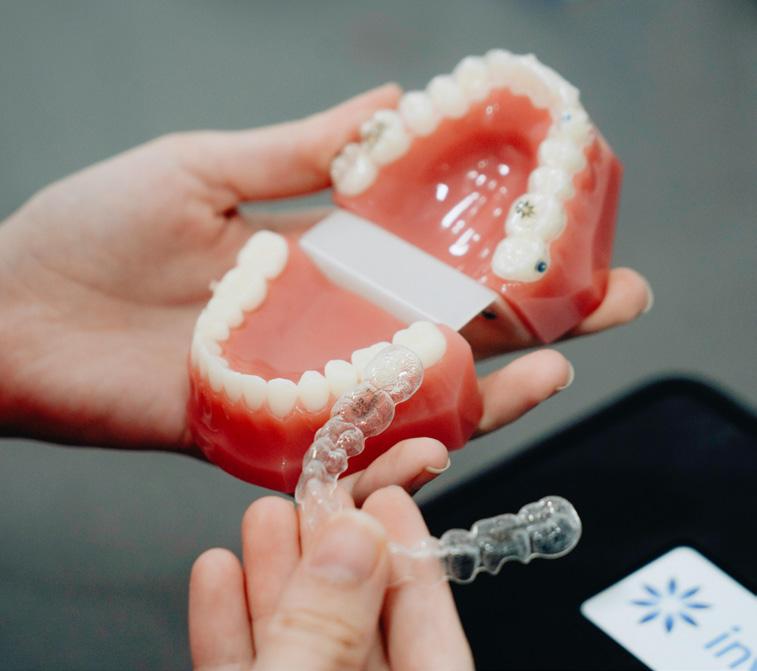
Adult orthodontics



Adult orthodontics is becoming increasingly popular as more and more adults are seeking to improve the alignment and appearance of their teeth. While orthodontia is often associated with kids or teenagers, adults are also realizing the benefits of orthodontic treatment and are seeking out options to improve their smile and the longevity of their teeth,
There are several reasons why adults may choose to undergo orthodontic treatment. Some adults may have experienced relapse from previous treatment, while others may have never had the opportunity for treatment in their youth. Additionally, some adults may have experienced changes in their teeth and jaw alignment over time, leading to the desire for orthodontic correction.
One of the most common reasons adults seek orthodontic treatment is cosmetics. A straighter, more aligned smile can greatly improve a person’s confidence and self-esteem. Additionally, properly aligned teeth are easier to clean and maintain, leading to better overall oral health.
There are several options available
for adult orthodontics. Traditional metal braces are still relevant, but North Fulton Smiles offers more discreet options such as clear aligners, which offers them to straighten their teeth without drawing attention to their orthodontic treatment. We offer both Invisalign and CandidPro. It is important to realize that adult orthodontics still needs to be doctor driven and not self-imposed. While direct to consumer orthodontics may be “cheaper” initially it has been shown that it can be “more costly” in the long run.
Adult orthodontics is a fantastic and conservative option for those who want to improve their smile and longevity of their dentition.




Brought to you by – North Fulton Smiles
PEXELS
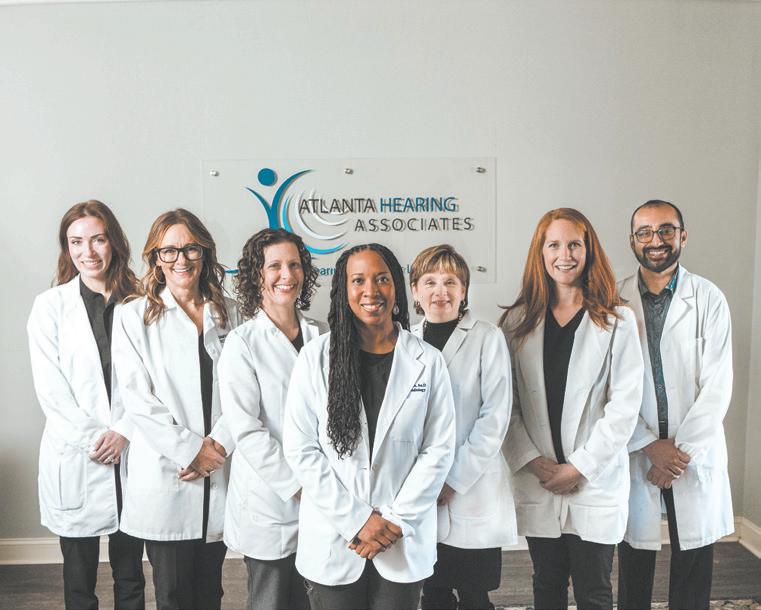
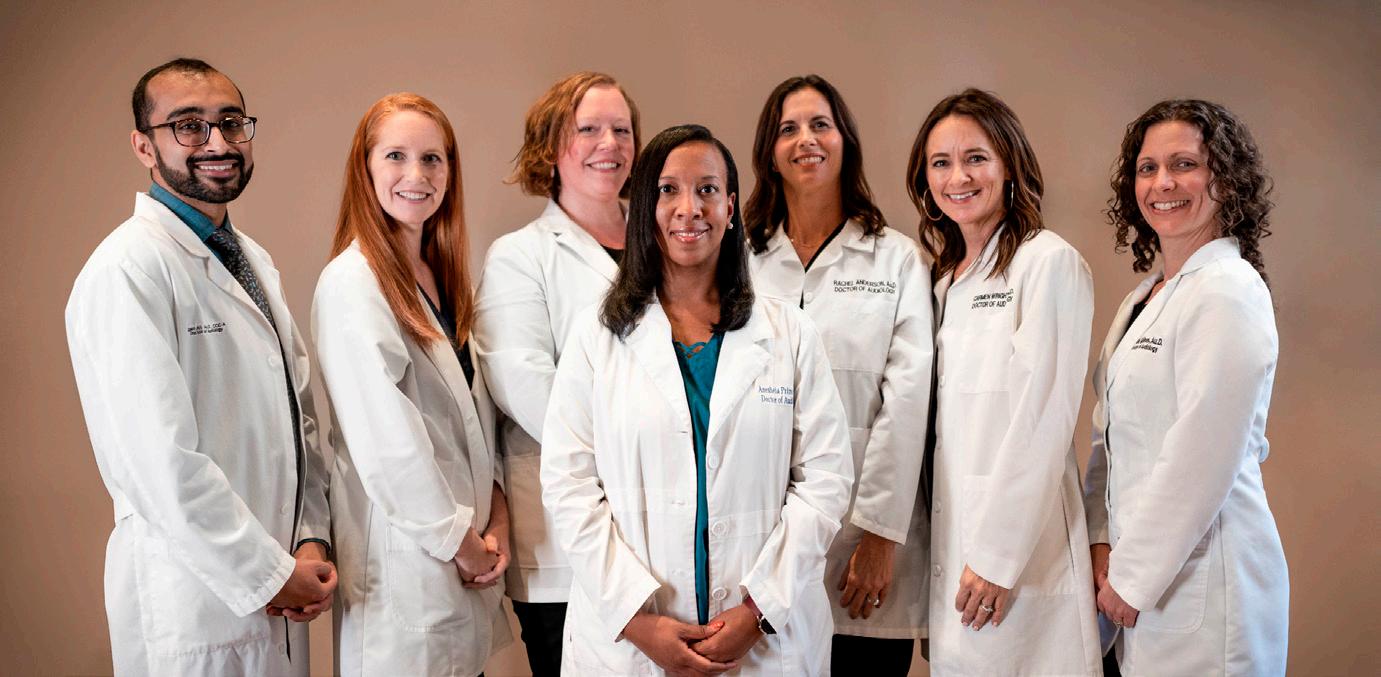


























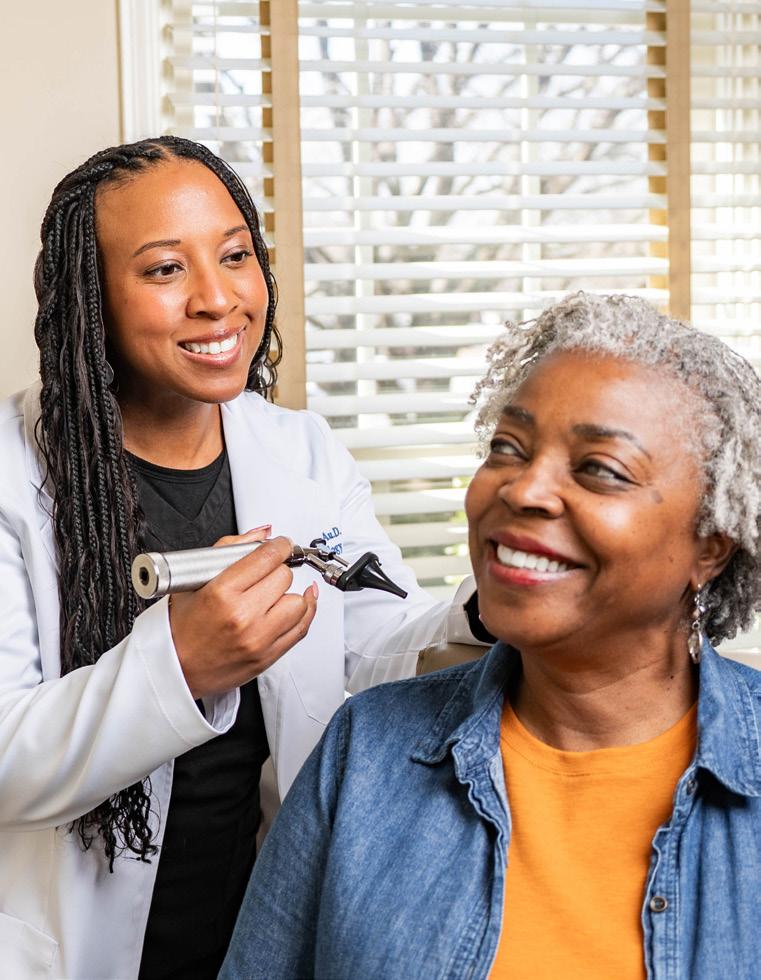
Atlanta
Atlanta Hearing Associates is a large audiology practice that encompasses 5 different locations throughout Georgia. Our offices provide comprehensive hearing tests, tinnitus assessments, ear cleaning, and hearing devices for all ages.
Every doctor you will meet is focused on your needs as a patient and works with every manufacturer to provide
a personalized fitting. Each location utilizes state of the art technology and family-oriented care to help guide our patients to the best hearing devices and information on hearing healthcare.
We also partner with different agencies to provide audiological care to veterans, ATF officers, reservists, police departments, Cochlear implants recipients, and community wellness groups.
We accept all major insurances for patients who have a hearing healthcare benefit that they are eligible to use.
Our offices are located in Atlanta, Decatur, Dunwoody, Lake Oconee, and Milledgevile.
Importance of skin checks for mature skin
Brought to you by - Dr. Kehinde Olumesi of Epiphany DermatologyBrookhaven
As skin matures, it undergoes various changes that necessitate regular skin checks to ensure overall skin health. Differentiating between age spots, healthy moles and potential skin cancers is crucial. Age spots, often appearing as flat, brown, or black spots on sun-exposed areas, are generally harmless but can be mistaken for more serious conditions. Early detection of skin cancer, including melanoma, basal cell carcinoma and squamous cell carcinoma, significantly increases the chances of successful treatment. Therefore, routine skin examinations are essential for mature skin to maintain health and catch any issues early.
Addressing skin conditions and rejuvenation procedures
Dermatologists can assist with a variety of skin conditions and rejuvenation procedures for mature skin. Common issues such as dryness, age-related pigmentation and conditions like rosacea, psoriasis and eczema, which can persist or develop with age, are also addressed with specialized care plans.
In addition to treating conditions, dermatologists offer rejuvenating procedures to enhance the appearance and health of mature skin. Treatments such as chemical peels, laser rejuvenation and injectable treatments like BOTOX® Cosmetic and dermal fillers can reduce the appearance of wrinkles, improve skin texture and promote collagen production. These procedures not only rejuvenate the skin but also boost confidence and overall well-being. Establishing a relationship with a dermatologist ensures that your skin receives comprehensive care tailored to its evolving needs, promoting longterm skin health and vitality.

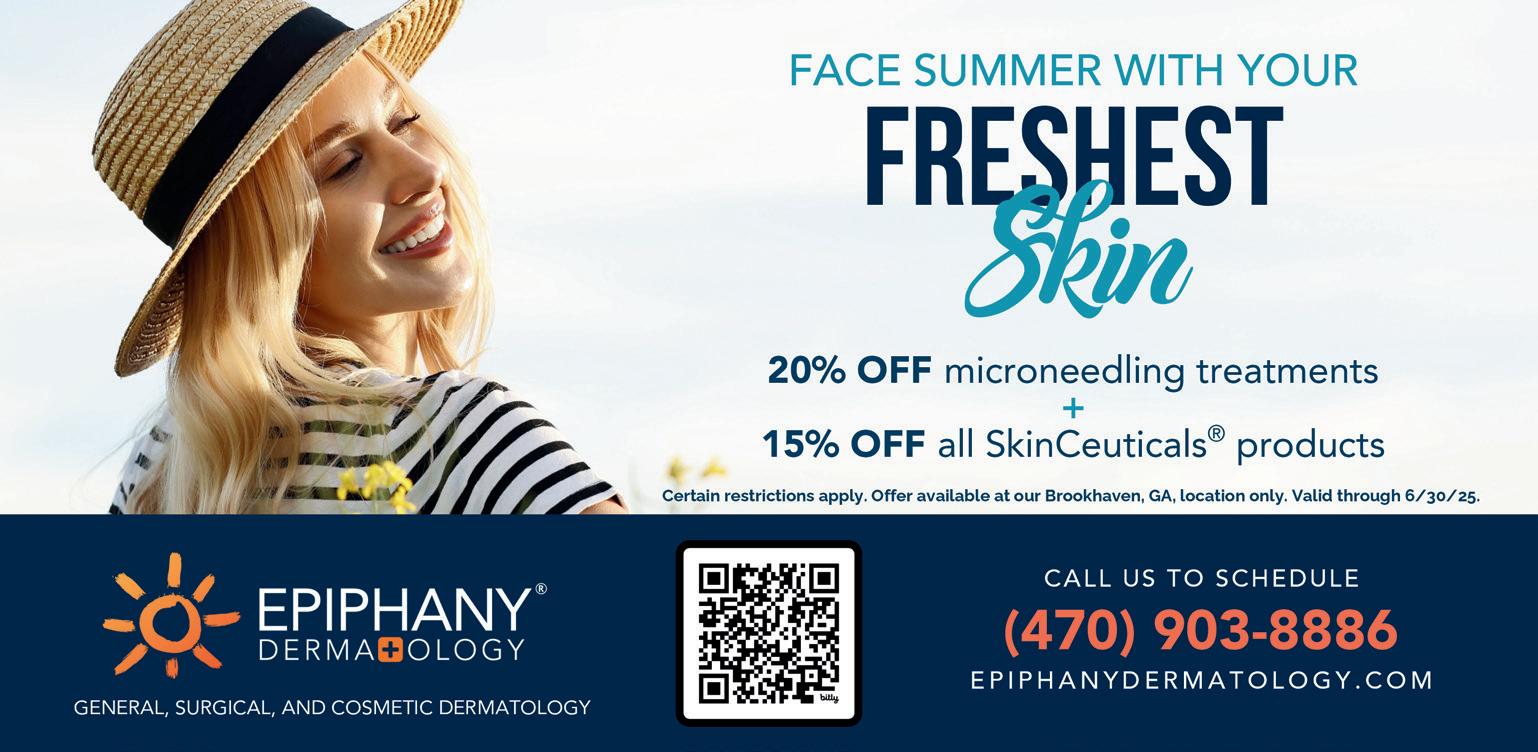


Lifestyle changes can transform your heart health
Brought to you by – Emory Heart & Vascular
High cholesterol and high blood pressure are chronic conditions that can lead to heart attacks, strokes and other forms of cardiovascular disease. The good news is that they are often preventable. Most people can lower their risk by adopting a heart-healthy diet, exercising regularly and maintaining a healthy weight. Even if you already have high cholesterol or high blood pressure, you can make changes now to lower your risk.
The link between high cholesterol and high blood pressure
Cholesterol is a fat-like substance in the blood. Our bodies make cholesterol, and we also get it from food. You’ve probably heard of good cholesterol, known as HDL (high-density lipoprotein), and bad cholesterol, known as LDL (low-density lipoprotein).
Too much bad cholesterol can cause atherosclerosis or plaque buildup in the arteries.
Atherosclerosis makes arteries stiff and narrow, and the heart has to work harder to pump blood through them. This increased work by the heart leads to high blood pressure. Most patients don’t have any symptoms until their blood pressure is significantly elevated. That’s why high blood pressure is known as the “silent killer.” Before you even know you have it, the condition can damage your heart, kidneys, brain or eyesight and increase your risk of heart disease and stroke.
How diet and exercise can lower your heart disease risk
Routine check-ups with your primary care provider can help you keep tabs on your blood pressure and cholesterol. If you are concerned about your risk for heart disease, it’s time to take action with your provider.
Ijeoma Isiadinso, MD, director of Heart Disease Prevention at Emory Heart & Vascular, encourages people to consider following a heart-healthy diet like the Mediterranean or DASH Diet. The Mediterranean diet is high in fiber, vegetables, fruits and fatty fish and low in red meats and processed and fatty foods. DASH, which stands for “dietary approaches to stop hypertension,” is a well-studied diet that is low in sodium and scientifically proven to reduce blood pressure. Exercising and maintaining a healthy weight will also improve blood pressure and cholesterol levels. Medication can also help if your clinician feels that it is needed in order to control your blood pressure and cholesterol to reduce your risk of heart disease.
Some people inherit high cholesterol
It is important to understand that high cholesterol isn’t solely caused by unhealthy food and lifestyle choices. It
can also be inherited. Certain genetic types of high cholesterol can increase the risk of premature heart attacks and strokes. One misconception about genetic high cholesterol is that people will outgrow it. This is not true. People with this form of high cholesterol need medication, in addition to a hearthealthy lifestyle, to lower their LDL levels.
Ready to transform your heart health?
We can help. If you have high cholesterol or high blood pressure, consider making an appointment with a cardiologist or preventive cardiologist at Emory Heart & Vascular. We can help you understand your risk for heart disease and help you make positive lifestyle changes.
Visit emoryhealthcare.org/ transform to learn more and schedule an appointment.
Family history of heart disease? Emory Heart & Vascular can help rewrite it.
MORE TREATMENT OPTIONS

Our expert heart & vascular team pioneers the most innovative techniques and treatments. Giving you more options and better outcomes than anywhere else. To make more “tickle monster!” moments like this possible.
The difference? Emory Women’s Center at Johns Creek uses research and innovation in health to provide exceptional care, close to home. From routine gynecology and menopause management, to high-risk pregnancies and specialty care, our team is here for your journey no matter where it takes you.
Visit emoryhealthcare.org/history to schedule an appointment.
Visit emoryhealthcare.org/women to schedule an appointment.




June is National Cancer Survivor Month
Brought to you by - Jonathan Stegall, MD

This month, we celebrate cancer survivors as part of National Cancer Survivor Month. For those of you who are reading this who are cancer survivors, congratulations! Surviving a cancer diagnosis is a significant accomplishment.
Despite the media attention given to the number of people diagnosed with cancer, as well as those who die
from cancer, I believe we should also focus on cancer survivorship. It is estimated that there are roughly 17 million cancer survivors in the United States. Due to significant advances in research and education, many people who are diagnosed with cancer are beating the disease.
I am very proud of the fact that I have many cancer survivors in my oncology practice. I can attest to the significant amount of hard work on the part of patients and their families,
as well as medical personnel. It truly takes a team of dedicated people to achieve that level of success, and my staff and I are honored to join our patients in their cancer journeys. If you are a cancer survivor, keep up the good work! Stay motivated in your quest to keep cancer at bay. For cutting edge cancer information, please check out cancersecrets.com to learn more about my bestselling book, award-winning podcast, and online cancer course.
































